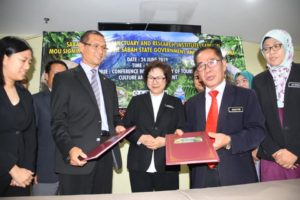In a big win for the Sunda pangolin, plans for developing Malaysia’s first pangolin conservation centre have been announced. The new Sabah Pangolin Sanctuary and Research Institute (SAPSARI) will be created in a national park, in south east Sabah. This has been made possible thanks to an agreement between the state government and Peter Chan, who has made a generous donation to kick-start the initiative.
The Sunda pangolin is one of four Asian pangolin species and is found across Southeast Asia, from central Myanmar through to Indonesia. It is listed as Critically Endangered on The IUCN Red List of Threatened SpeciesTM and has been disappearing across its range due to poaching for illegal trade. Despite being protected by both national and international law, the Sunda pangolin is under threat in Malaysia where it is hunted for both local consumption and use and for international trafficking to countries including China. The newly announced sanctuary and research centre will be an important development in the conservation of Sunda pangolins in Malaysia. Little is known about the Sunda pangolin in Sabah, and so the research conducted by SAPSARI will be key to understanding the status and behaviour of this highly threatened species on the island. Likewise, customs departments frequently intercept live pangolins being trafficked illegally, and the sanctuary will play an important role in rehabilitating seized pangolins so they can be released back into the wild.
Following a pangolin conservation initiative that was set in motion in October 2018 by Chan, a Memorandum of Understanding (MoU) was signed last month between SAPSARI and Augustine Tuuga, the director of Sabah Wildlife Department, and officiated by the Minister of Tourism, Culture and Environment, Datuk Christina Liew, to create the sanctuary.

Chan, the founder of SAPSARI, is a retired engineer who has a passion for wildlife and nature. SAPSARI is set to be established within the protected Tawau Hills National Park, a 280 sq. km rainforest, with spectacular waterfalls, streams and hot springs located in Tawau, Sabah. The Institute will be managed and operated under the leadership of Elisa Panjang, a local Sunda pangolin expert, and member of the IUCN SSC Pangolin Specialist Group.
SAPSARI’s main goals will be research, education and the rehabilitation of Sunda pangolins, and the centre will collaborate on scientific research globally. It will provide educational programmes and the management of animal rescue and release operations. An initial seed fund of RM1 million (USD $242,000) was provided by Peter Chan, however SAPSARI will need support from government, corporate bodies, public as well as individuals to advance its vision and goals.
The Sabah Wildlife Department and Sabah Parks will decide on the exact location of the facility within the Tawau Hills National Park and work is expected to begin on its creation by the end of this year.
The centre’s mission is to prevent the extinction of the Sunda pangolin, especially in Malaysia, with the Sabah team leading the initiative. It will work to achieve this by rehabilitating the high number of pangolins seized from illegal trade and releasing them back into the wild, as well as producing research into the ecology and behaviour of Sunda pangolins, as well as raising awareness and educating the public. We look forward to seeing the positive impact SAPSARI will have on the conservation of the Sunda pangolin in Sabah.
Elisa Panjang
Pangolin Conservation Officer at the Danau Girang Field Centre
Member of the IUCN SSC Pangolin Specialist Group
Image 1: SAPSARI official logo
Image 2: MoU signing between Peter Chan (second from right) and Augustine Tuuga (second from left) witnessed by Datuk Christina Liew (middle)


